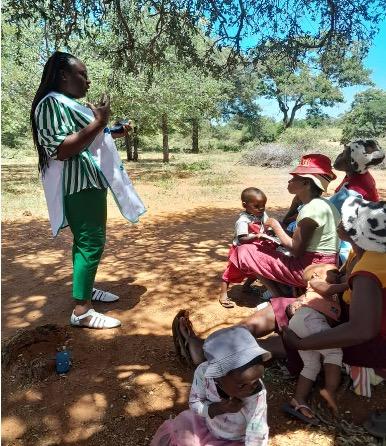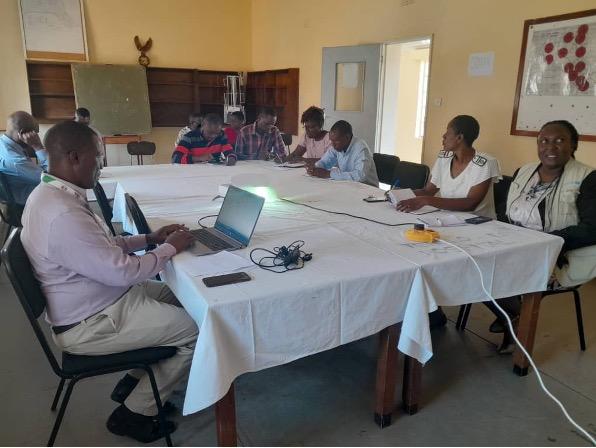Overcoming Challenges with Community Empowerment: Bridging the Gap to Ensure All Children are Vaccinated in Zimbabwe
Summary
This article discusses the success story of overcoming challenges with community empowerment in Zimbabwe, focusing on ensuring all children are vaccinated through innovative Social and Behavior Change (SBC) strategies.
Success Story – Overcoming Challenges with Community Empowerment: Bridging the Gap to Ensure All Children are Vaccinated in Zimbabwe
In 2023, the resurgence of circulating Vaccine Derived Polio Virus 2 (cVDPV2) in Harare marked a critical juncture for public health in Zimbabwe. The Ministry of Health and Child Care (MoHCC) swiftly declared a public health emergency, underscoring the urgency of addressing the outbreak. In response, UNICEF Zimbabwe, in collaboration with the MoHCC, spearheaded an innovative approach to eradicate polio through a series of planned Supplementary Immunization Activities (SIAs) using the novel Oral Polio Vaccine type 2 (nOPV2), set to commence in early 2024.
UNICEF Zimbabwe’s strategy relied on leveraging Social and Behavior Change techniques to enhance community engagement and vaccine acceptance. Recognizing the diverse challenges across Zimbabwe's varied landscapes—from densely populated urban areas to remote rural communities—UNICEF focused on tailor-made SBC interventions. These initiatives were designed not only to inform and educate but also to actively involve communities in the vaccination process, thereby fostering a sense of ownership and trust in the health measures being implemented.
This comprehensive approach aimed at transforming community attitudes towards immunization, addressing vaccine hesitancy, and ultimately ensuring that every child in Zimbabwe is protected against polio. By strategically employing SBC, UNICEF Zimbabwe endeavored to bridge the gap between healthcare services and community needs, setting a robust framework for the successful implementation of the polio eradication campaign.
Case Study: Beitbridge District, Matabeleland South Province
In the rural expanse of Beitbridge, at Majini Clinic in Ward 12, the challenge was stark. The community, consisting of 29 children under five and 61 children under ten, faced increased vaccine hesitancy, primarily influenced by religious beliefs opposing vaccination. The local SBC committee recognized the necessity of tailored engagement strategies.
Interventions and Community Dialogues:
- Leadership Engagement: The district SBC committee initiated dialogues with village heads and clinic staff, focusing on the critical need for vaccinations against polio.
- Addressing Vaccine Hesitancy: Through these discussions, leaders were equipped with information to advocate for vaccination effectively.
- Home Visits and Peer Support: Community health workers and peers of hesitant caregivers conducted door-to-door educational visits, which were crucial in changing perceptions.

Impact:
These efforts culminated in a remarkable success, with almost all children being vaccinated at their convenience, in locations ranging from their gardens to local waterpoints. The flexibility in vaccination times and sites played a crucial role in accommodating the community's needs, demonstrating the efficacy of localized and empathetic approaches.
Case Study: Bulawayo Metropolitan Province
Contrasting the rural dynamics of Beitbridge, Bulawayo’s urban environment presented a unique set of challenges, marked by the diversity and scale of its population. Ensuring no child was left unvaccinated required an expansive and inclusive stakeholder engagement approach.
Innovative Stakeholder Engagement:
- Wide-reaching Meetings: Stakeholder meetings at Tower Block included not just health officials but also city council members, government departments, residents' associations, and the media.
- Community Mobilization: Through WhatsApp groups, local influencers, and private practitioners, the campaign messages reached a broad audience, ensuring heightened awareness and participation.
Impact:
The engagement strategies led to vaccination rates exceeding expectations, with coverage reaching 111% and 114% in the first and second rounds, respectively. This success was a testament to the power of comprehensive community mobilization and the proactive role of city leadership in health initiatives.

Conclusion
The success stories from Beitbridge and Bulawayo illustrate the profound impact of SBC strategies in overcoming the barriers to polio vaccination. By adapting approaches to fit the unique contexts of rural and urban settings, Zimbabwe has not only navigated a public health crisis but has also set a precedent for future health campaigns. These efforts showcase the effectiveness of community engagement and the critical role of tailored, empathetic communication in achieving public health goals.

